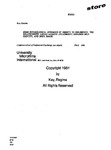SOME PSYCHOLOGICAL DYNAMICS OF OBESITY IN CHILDHOOD: THE RELATIONSHIPS AMONG ANXIOUS ATTTACHMENT, IMPAIRED SELF-IDENTITY, AND BODY IMAGE
| dc.contributor.author | Regina, Kay | |
| dc.contributor.other | School of Psychology | en_US |
| dc.date.accessioned | 2013-10-31T11:44:08Z | |
| dc.date.available | 2013-10-31T11:44:08Z | |
| dc.date.issued | 1981 | |
| dc.identifier | NOT AVAILABLE | en_US |
| dc.identifier.uri | http://hdl.handle.net/10026.1/2501 | |
| dc.description.abstract |
The psychological dynamics of obesity in children were studied from the viewpoint of Bowlby's (1969; 1973) attachment theory. Literature was reviewed which reported a lack of self-differentiation in the obese which is consistent with anxious attachment. Underdifferentiation causes conceptual confusion about bodily needs and states resulting in external directedness that is reflected both in eating as a response to environmental cues and in field dependence. Studies implicate overprotective, age-inappropriate, and indulgent parenting in the development of both obesity and field dependence. Such parenting is typical of anxious attachment which was posited in this study as a psychological component in the etiology of obesity in childhood. It was hypothesized that obese children are more anxiously attached, have poorer self-concepts, are more field dependent, and have greater body image distortion than non-obese children. The principal instruments administered were: The Hansburg Separation Anxiety Test (HSAT), Piers-Harris Children’s Self-Concept Scale, MMPI Lie Scale, Embedded Figures Test, Body Image Disturbance Scale, and a Behavioral Checklist (BCL) for anxious attachment. The HSAT did not discriminate between the two groups, but the obese were significantly more anxiously attached than the non-obese on the BCL. The groups did not differ in self-concept, a finding which may be mitigated by the obese children's higher Lie Scale scores which indicate they may be less frank as to their feelings about themselves. The obese were more field dependent and displayed greater body image distortion. Anxious mother-child attachments can contribute to the development of obesity by limiting children's motility, causing them to be overfed due to neurotic anxiety in the mother, and preventing the establishment of good peer relations so that children overeat to comfort themselves. Maternal denial of the separateness of the child and limitations on the child's activities prevent the development of an adequate body image so that the self is not adequately differentiated from the mother-child dyad. The child remains externally directed, field dependent, and fails to learn to eat in response to nutritional rather than emotional need. | en_US |
| dc.language.iso | en | en_US |
| dc.publisher | University of Plymouth | en_US |
| dc.title | SOME PSYCHOLOGICAL DYNAMICS OF OBESITY IN CHILDHOOD: THE RELATIONSHIPS AMONG ANXIOUS ATTTACHMENT, IMPAIRED SELF-IDENTITY, AND BODY IMAGE | en_US |
| dc.type | Thesis | en_US |
| plymouth.version | Full version: final and full version as approved by the examiners at the time of the award of your degree | en_US |
| dc.identifier.doi | http://dx.doi.org/10.24382/1322 | |
| dc.identifier.doi | http://dx.doi.org/10.24382/1322 |
Files in this item
This item appears in the following Collection(s)
-
01 Research Theses Main Collection
Research Theses Main


